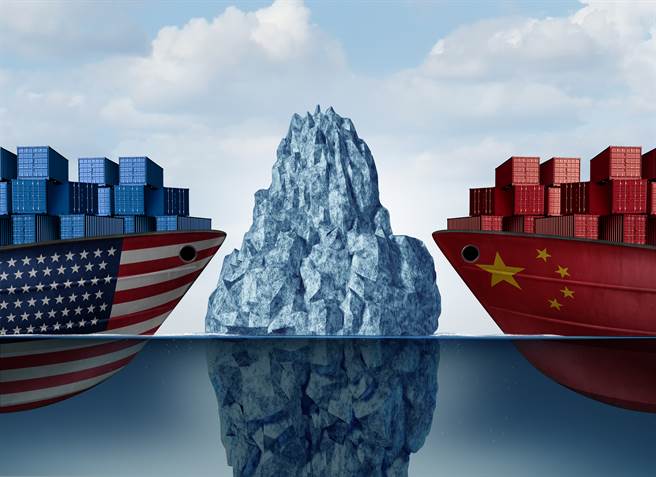Former U.S. President Donald Trump launched a trade war and a technology war against mainland China, successfully shifting the share of smartphone giant Huawei from competing with Samsung to No. 5, but this may also be his only result. Andrew Rennemo, a British scholar who has long studied economics, trade and diplomacy, pointed out that Trump pressure forced Beijing to join the economic and trade sanctions game, and Washington has become the best model to imitate. The mainland may become a major power that can compete with the United States in economic and trade sanctions.
In the American diplomatic magazine “The Diplomat” (The Diplomat), Lun Mo called “How China joined the sanctions game” (How China joined the sanctions game), and pointed out that China originally had a historical aversion to sanctions and was also in the sanctions game. The late and reluctant contestants, because their ideology originally believed that sanctions were tools for Western imperialism and the violation of the sovereignty of other countries, and they themselves were often sanctioned by the United States and Europe. In the latter part of the Cold War, China regularly used its status as a permanent member of the United Nations Security Council to oppose sanctions against North Korea, Zimbabwe, Libya, and Iran.
China only began to learn sanctions skills after 2010. Beijing has imposed various economic and trade sanctions on governments or companies at least 9 times, including Lotte, which provided land in 2017 because South Korea’s Park Geun-hye government approved the United States to deploy THAAD (Terminal High Altitude Defense Missile) system The (Lotte) group was basically driven out of the mainland, and Korean entertainment was also unofficially banned on the mainland. In 2019, due to the support of the Houston Rockets director Daryl Morey for supporting the Hong Kong demonstration, the NBA broadcast was stopped and the Rockets completely disappeared. Sports news or Chinese game records.
Most of these sanctions are officially classified as regulations, technical issues, or non-governmental spontaneous patriotism, which can provide reasonable and undeniable informal measures. However, Trump’s attacks and a large number of abuses of sanctions have enabled Beijing to learn from the trauma and become a more willing and capable country to weaponize the economy to win diplomatic victories and stop external suppression of Chinese companies.
Trump is undoubtedly the key to allowing Beijing to supplement “sanctions with Chinese characteristics” with more formal capabilities, and the toolbox is becoming more and more complete. On the other hand, the growth of economic and trade and financial power and the relative decline of the United States have also made Beijing more capable of launching sanctions, and the United States is the best teacher in terms of sanctions tools.
Last year, Beijing’s “Export Control Law” and “Unreliable Entity List” are exactly like Trump’s use of the export control list for the mainland, the list of entities that prohibit business dealings with the United States, and the measures to prohibit the export of key technologies also refer to US sanctions. The spirit of long-arm jurisdiction. Lenmo believes that it is difficult to say that these new measures were not inspired by the United States. Therefore, Joe Biden is actually facing a China with new sanctions capabilities, which can be said to be Trump’s legacy.
Lunmo believes that after joining the sanctions, Beijing is already on the way to quickly catch up with the United States, and it no longer rejects the use of this method to achieve political or economic goals, but whether it will develop in this direction remains variable. First of all, the Beijing framework focuses on prohibiting sanctioned targets from entering the Chinese market or acquiring key technologies. Considering the scale of its consumer market and its dominance in 5G patents, it is a meaningful and effective deterrent ability, but this may also reflect that the mainland’s financial strength is still insufficient, because Compared with China’s forecast to surpass the United States as the largest economy in 2028, the renminbi accounts for less than 2% of international transactions.
In Lenmo’s view, Washington also has a tendency to weaponize the U.S. dollar. The decoupling of Trump’s sanctions and threats, as well as the U.S.’s unlimited quantitative easing and massive debt issuance to save the economy, all make Beijing feel the need to reduce its dependence on the U.S. dollar. It can also be an important means to promote the international use of RMB.
Lun Mo expects that Beijing may be reluctant to use too many sanctions, and the greater purpose is to establish a deterrent effect. This may ultimately result in a mechanism similar to the MAD (Mutual Guaranteed Destruction) mechanism between the United States and the Soviet Union during the Cold War, and economically, it will adopt limited restrictions. In extreme cases, third countries or companies may be forced to choose sides, but in practice, more countries seem to be more inclined to strike a balance when under pressure. For example, Trump has successfully defeated Huawei’s smartphone business, but is banning the company’s 5G equipment China’s global lobbying activities failed miserably. Only three of the 61 lobbying countries agreed to sever ties with Huawei.
He concluded that it is difficult for punitive diplomacy to go far. The intertwined economic interests are still the best opportunity to change Beijing’s behavior, but the United States should make changes from Biden’s tenure and seek China’s status in the world economy. Compatible influence, expressed acceptance, and a clearer bottom line is needed to define which areas are China’s actions that infringe on the main interests of the United States, rather than strategic chaos and mutual adoption of massive economic sanctions.
(Zhongshi News Network)
– .


